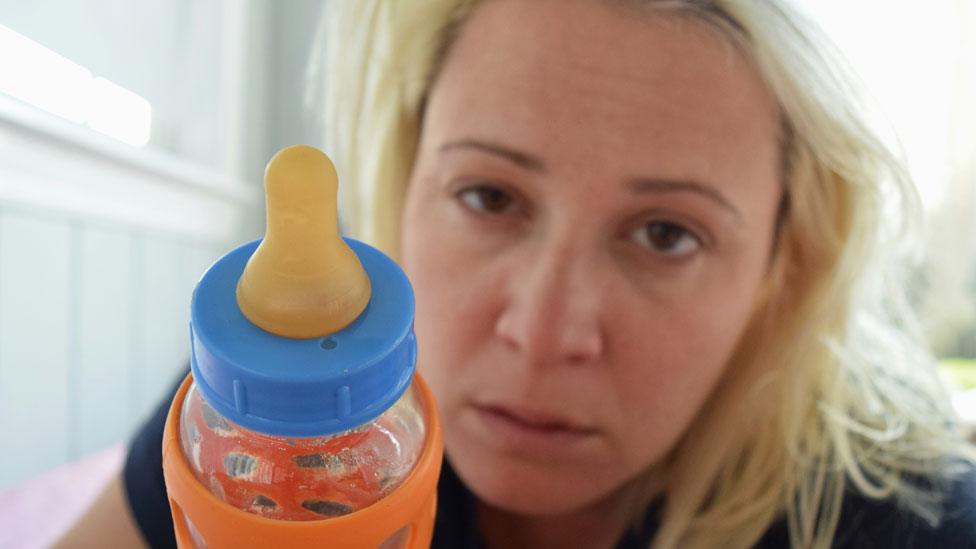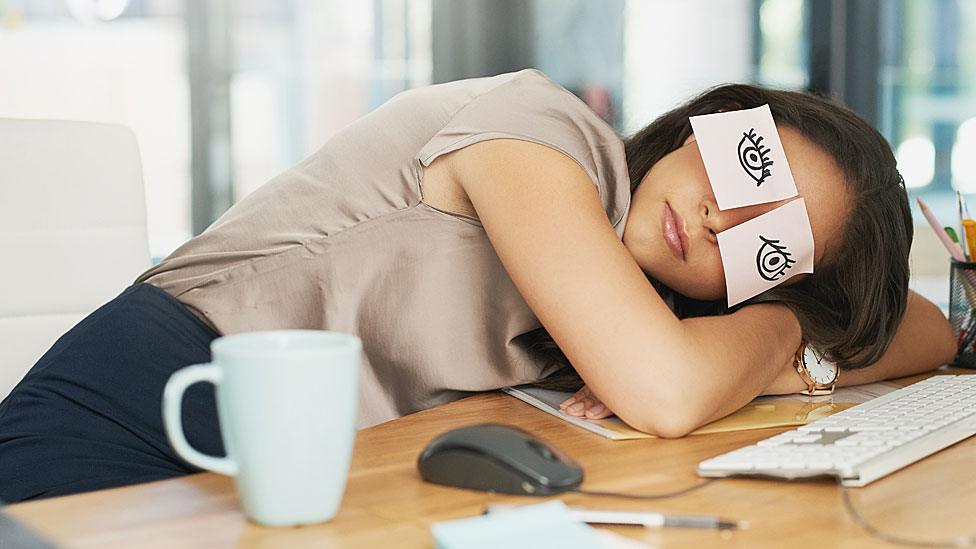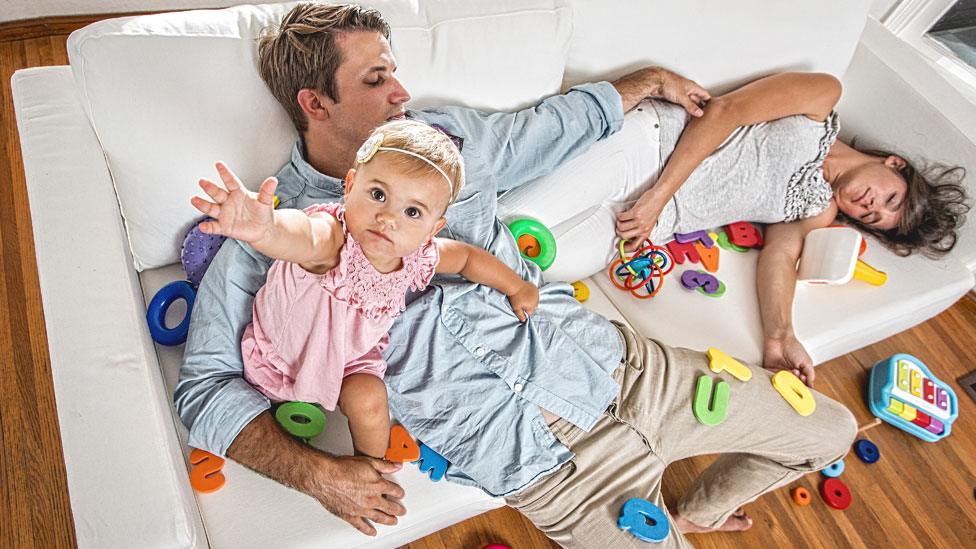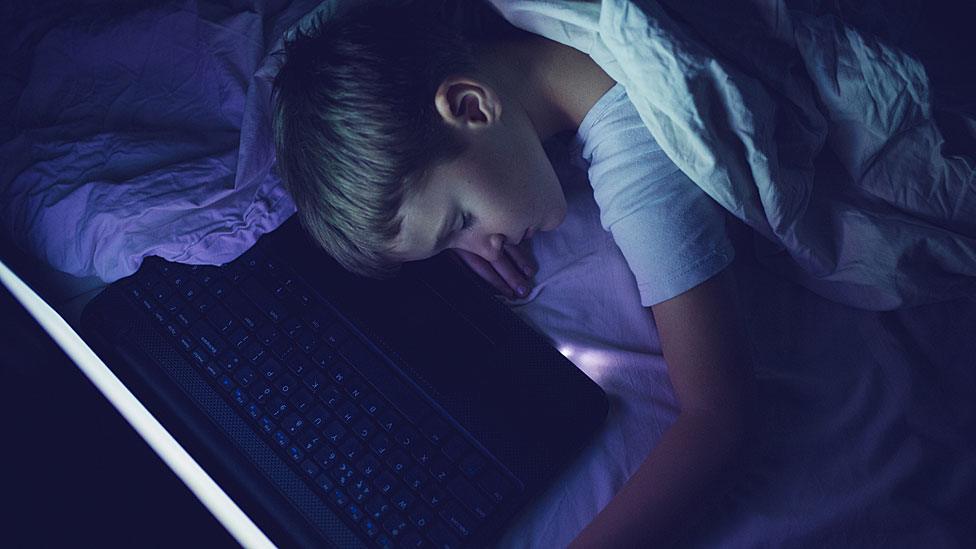13 weird ways parents get children to sleep
- Published
- comments

New year and knackered? Please, please go to sleep...
Exhausted after Christmas and the new year? Are you craving a few more hours in bed? Are you a parent whose sleepless children are leaving you a sleep-starved wreck?
These days in early January are claimed as the darkest days for sleep deprivation.
The modern barometer for such moments - the number of Google searches - shows "child won't sleep" as reaching a worldwide peak of searches at this time of year.
You can just imagine those weary fingers tapping out the words, slumped over a mobile phone in the middle of the night, hoping for an answer.
New year zombies
Children are more wired than Maplin's shop window. They've been living on late nights, red-eyed computer games and party food and the chances of falling asleep are pretty much zero.
Then they have to go back to school, like zombies heading into the mid-winter gloom.
Adults as well as children are suffering. Early January is also the peak time for searches for "sleep" and the more plaintive "I need sleep".

Bad jumpers, even worse sleep. Christmas has all the ingredients for leaving you exhausted.
But desperate times require desperate measures. And parents, struggling with their children's lack of sleep, develop their own emergency tactics.
Research for sleep apps, Moshi Twilight Sleep Stories and calm.com, recently identified some of the most eccentric ideas.
They are all claimed as having been tried somewhere. Although you can only imagine how bad things must have become.
And none of them are likely to appear in those unbearably smug parenting books for the perfect family.

13 weird ways to get children to fall asleep
Explaining to your child the infrastructure plans of China's leader, Xi Jinping
Play a recording of a chapter from an 18th Century Scottish economics book, read by a really boring teacher
Watch a video of a crossword puzzle tournament
Listen to an hour-long recording of people yawning
Running a vacuum cleaner
Watch a slow-motion film about sheep grazing
Inventing an imaginary figure, like "The 8 o'clock man", who catches any children still awake after 8pm
Lying the child on the parent's chest, and the parent slowly spinning in a circle
Putting them in the car and driving
Humming the national anthem
Turning the child's bed the other way round
Putting a ticking clock under the child's pillow, to mimic the mother's heartbeat
Putting an item of clothing that smells of the mother in the child's bed

'Perfect storm'
Prof Kevin Morgan, from the Clinical Sleep Research Unit at Loughborough University, says that if you had to design an experiment to disrupt sleep and leave people feeling exhausted it would probably look like the festive season.
He says it's a "perfect storm" of late nights, over-eating and unpredictable getting-up times.

Wide awake and ready for another day at work. Who are you kidding?
Into that mix can be added alcohol, which damages the quality of sleep, and an underlying level of stress about getting ready for Christmas and new year.
It's a cocktail for sleep exhaustion - and Prof Morgan says this can be compounded by this being the "bleakest, darkest time of the year".
Regularity and routine are the keys to good sleep, he says. But in the Christmas holidays, everything about family life is "topsy-turvy".
"By the time you get to 2 January you're probably knackered. The children are rattling around and tempers are fraying," says Prof Morgan.

The festive season can leave people exhausted and out of routine
Setting a regular routine
There are other less unusual approaches to improving children's sleep.
The NHS advises parents to ensure regular bedtimes and routines., external
It suggests a bath before bed and then reading a story, in a room that's not too brightly lit.
Computers, mobile phones and televisions should all be switched off, as they can all disrupt going to sleep.
The NHS suggests stopping using screens an hour before children go to bed.

The NHS says that children should not use screens for an hour before bedtime
There is also advice on the bedroom, which it says should be "dark, quiet and tidy". There should be curtains to keep out the light and a temperature that's not too hot or too cold.
Prof Morgan says the basic ground rules for good sleep depend on establishing regular habits.
And he says it will help if parents make sure children get out into the daylight, rather than staying in front of TV and computer screens.
But he says there are no "magic answers".
"Children get incredibly wound up at Christmas, and wound-up people don't sleep."